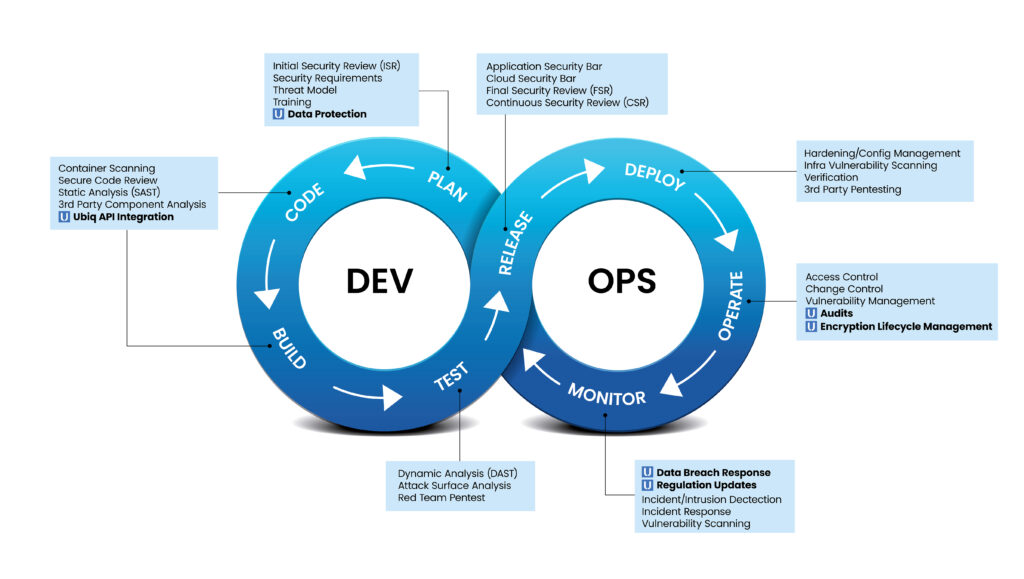
Integrating Security into the Continuous DevOps Cycle with Ubiq
Many organizations have adopted DevOps practices to streamline and optimize their development and release processes. By leveraging automation and agile development methodologies, they eliminate unnecessary manual work and increase the speed and frequency of releases.
One issue with DevOps as initially conceived is that it does not make any changes to security activities, resulting in an outdated approach to security. Often, security is not addressed and security testing was not performed until just before release, which is a major driver of the thousands of new vulnerabilities discovered each year.
To address this issue, many organizations are making a move towards adopting DevSecOps, which weaves security into every stage of the continuous DevOps lifecycle. However, most developers lack a security background, which can make implementing the security aspects of DevSecOps more challenging. When it comes to encryption of data at rest, this is where Ubiq can help.
Ubiq and DevSecOps
Ubiq is an encryption platform designed to make it easy for developers to secure their data. Effective encryption is essential for protecting against data breaches and achieving compliance with data protection regulations. With Ubiq, developers can easily meet requirements and more intuitively integrate security and encryption into their development and operations processes.

The diagram above shows the stages of the Continuous DevOps Cycle. For each stage, the callouts outline the required steps to effectively integrate security to form a DevSecOps cycle. The areas where Ubiq can help with improving security and strength of data protection are indicated with bold text across the various stages of the DevSecOps process.
For most systems, all stages of the DevSecOps cycle will be occurring simultaneously, with older, production code in the Ops stages and newer, development code in the Dev stages.
Plan
The Plan stage of the DevOps process covers everything before development begins. This includes gathering requirements and designing a system that is capable of meeting them.
In the modern development world, data security and regulatory compliance are major concerns driving security requirements. If software processes sensitive data or data protected under data privacy laws like the General Data Protection Regulation (GDPR) or the Payment Card Industry Data Security Standard (PCI DSS), then that data needs to be appropriately and strongly protected.
With Ubiq’s Platform, developers have easy access to encryption and key management functions that meet the requirements of all data protection laws.
Code and Build
Using the plan from the previous phase, the development team will be writing code to implement features and satisfy requirements. At this point, the developers need access to cryptographic functions that meet the regulatory and security requirements identified in the planning stage.
Ubiq’s API includes support for all major programming languages. By importing the appropriate Ubiq library, developers gain access to easy-to-use encryption functions that can be painlessly integrated into their code.

The code sample above shows a sample encryption function in Python. Once credentials have been loaded from a secure location, encrypting data only requires the developer to make a call to ubiq.encrypt. Behind the scenes, Ubiq configures the encryption algorithm with any necessary parameters and performs the encryption. When access to the data is needed, a call to ubiq.decrypt produces the original plaintext.
Operate
After the software has been written, tested, released, and deployed, it enters the Operate stage of the DevSecOps cycle. From a security perspective, this stage covers several aspects. Ubiq can help with two of them:
- Audits: Organizations subject to data protection regulations will be required to undergo periodic compliance audits. With Ubiq, an organization can easily demonstrate that the encryption used for protected data meets regulatory requirements.
- Encryption Lifecycle Management: Encryption keys may need to be retired and replaced during the life of an application. Ubiq’s Platform makes key management easy, streamlining the process of retiring encryption keys and updating encrypted data to use the latest key.
Monitor
The Monitor stage of the DevSecOps lifecycle focuses on identifying and responding to events in the system. This includes security events that no company wants to experience (but most of them will). With Ubiq, management of major security events is simplified and streamlined.
Two examples of how Ubiq helps with DevSecOps monitoring include:
- Data Breach Response: During a potential data breach, the most important question is what data has been exposed to an attacker. With Ubiq’s application-layer encryption and integrated key management, access to data is limited to the applications that need it, limiting the impact of a data breach.
- Regulation Updates: Data protection laws are constantly evolving, and encryption requirements may change over the years. With Ubiq, updated encryption requirements will be handled behind the scenes by the platform, ensuring that an organization’s encryption algorithms are always compliant with the latest version of the regulation.
Achieving DevSecOps with Ubiq
Moving from DevOps to DevSecOps will provide a number of advantages to an organization. It can also be a major effort for developers who need solutions that simplify and automate the process of integrating security into development pipelines.
Ubiq’s encryption platform provides a simple and intuitive capability for adding stored data encryption to applications, which is a vital part of data security and regulatory compliance. Try out the Ubiq Platform for yourself to see just how easy it is to implement cryptography correctly and secure any form of application data.
Setup is quick and easy
Ready to get started?
Create a FREE account instantly and start encrypting data or get in touch to discuss a custom package for your organization.
